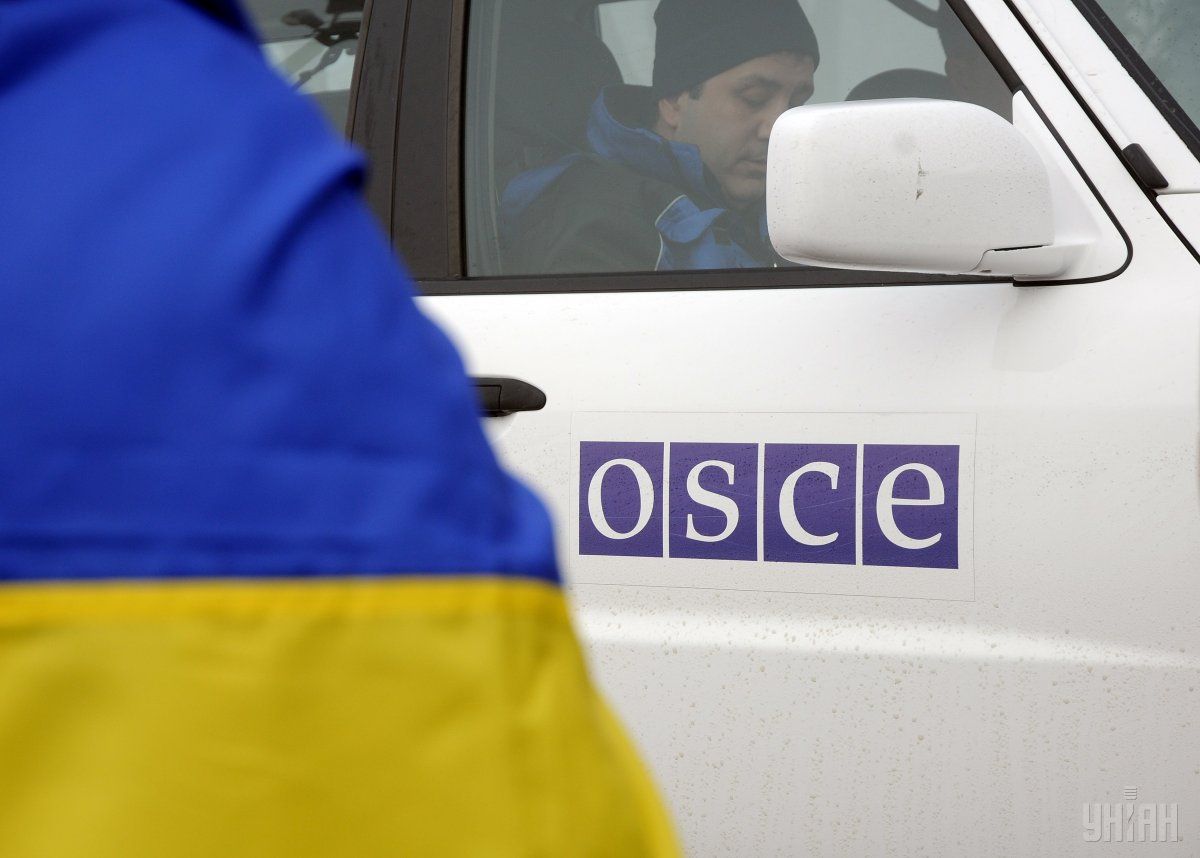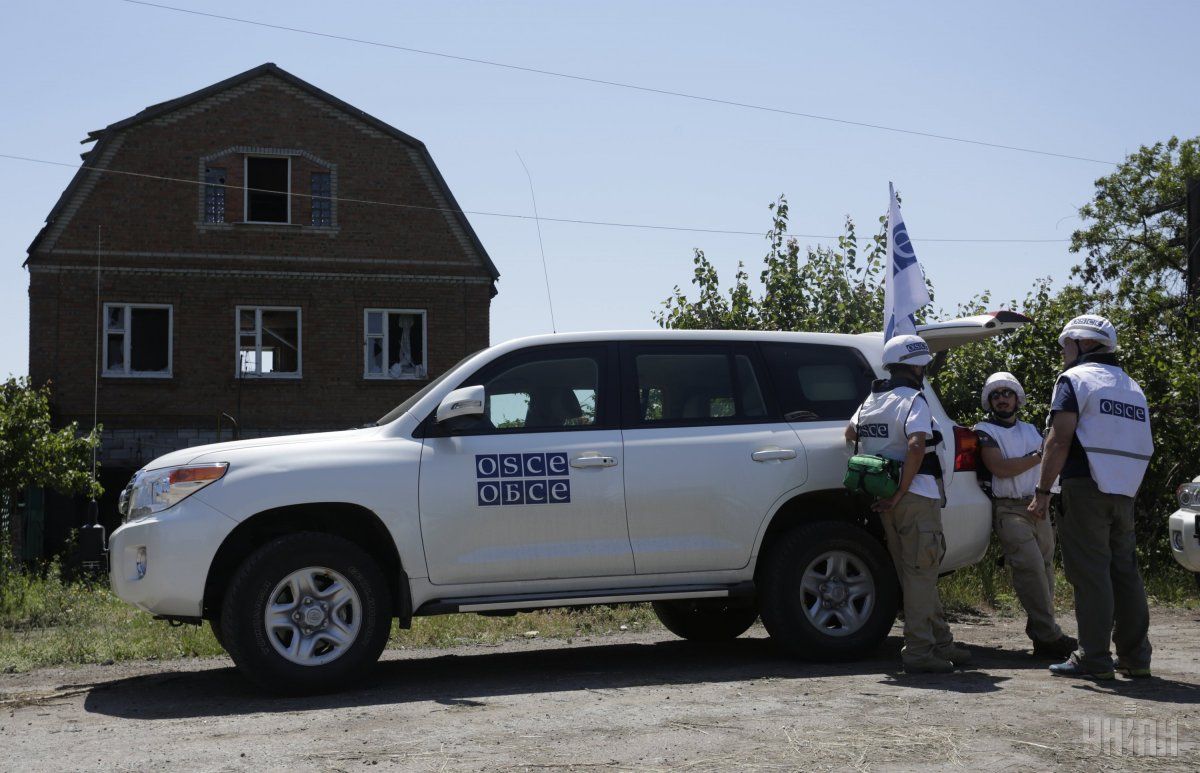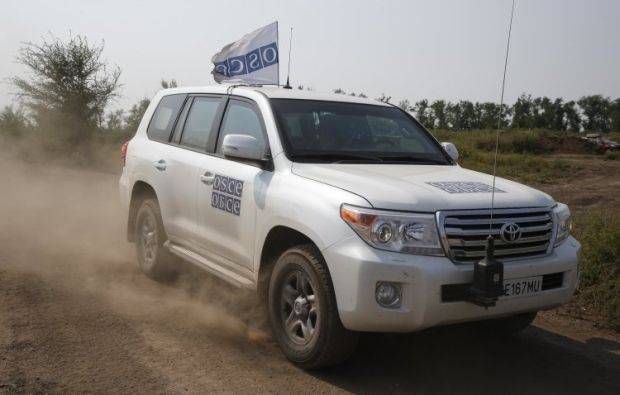
Control of Donbas: Mission impossible
It is difficult to argue that the issue of possible local elections in Donbas should only be discussed in close conjunction with the restoration of full control over the situation in the east of Ukraine. UNIAN has asked the experts who and how can secure such control.
After the agreement on the so-called "Easter truce," OSCE monitors celebrated the reduction of violence in Donbas in general, but tension increased in areas where the adversaries’ positions are located close to each other. However, for several weeks, Ukraine’s Western partners have been increasingly pushing for the idea of holding elections in the areas of Donetsk and Luhansk regions beyond Kyiv’s control. However, Ukraine stands firm, saying that holding the elections is possible but first, it is necessary to restore control in Donbas, as people can actually get shot...
To ensure security of the elections in Donbas, the deployment in the east of Ukraine of an OSCE international police mission is being discussed
According to Assistant U.S. Secretary of State for European and Eurasian Affairs Victoria Nuland, the restoration of a secure environment in Donbas, which the region lacks, is a prerequisite for the holding of elections. And to ensure security of the elections in Donbas, the deployment in the east of Ukraine of an OSCE international police mission is being discussed, so that the voters could vote freely. Ms Nuland noted that the OSCE Special Monitoring Mission did not always succeed in fulfilling its role. Therefore, the question of additional measures is still open, according to the U.S. official who held a press conference during her Kyiv visit last week.
Disputed issue
In fact, Ukraine does not oppose the deployment in the east of the country of an armed OSCE police mission. According to President of Ukraine Petro Poroshenko, such format of the mission is needed to "ensure control over the ceasefire, protection of weapons withdrawn, ensuring the withdrawal of the Russian occupation forces from the occupied territories, and ensuring effective control over the uncontrolled section of the Ukrainian-Russian border, so that new regular troops and weapons did not enter the territory of Ukraine."
It is interesting that such an idea, albeit with some reservations, is also supported by Russia. In particular, according to Russian President Vladimir Putin, the Kremlin is ready to facilitate the process of deployment of armed OSCE staff in Donbas. But the Kremlin is not talking about the Ukrainian-Russian border (as Kyiv insists), but the contact line. In addition, Moscow also believes that the deployment of armed OSCE personnel should be "coordinated" with the militants.
This idea remains disputable within the OSCE, although the organization does not rule out discussions o this matter. OSCE Secretary General Lamberto Zannier said the other day that this issue should be considered by all members of the organization. "We need a clear proposal, which will then be reviewed. The decision should be taken by 57 OSCE member states," he said.
Zannier said that today, there are about 700 OSCE SMM monitors in Ukraine. However, the current mission's mandate does not permit its members to use weapons.
In addition, the OSCE had no precedents for the creation of an armed mission. Moreover, no negotiations have been held within the OSCE or Normandy Format on changing the civilian nature of the SMM. IN particular, this has been confirmed by Germany, now Chair in the OSCE. A spokesman for the German Foreign Ministry, Martin Schaefer, said that Germany had asked the OSCE Secretariat to develop options for enhancing security during the possible local elections in the occupied part of Donbas, but the creation of an armed mission is not on the agenda yet.
Today, there are about 700 OSCE SMM monitors in Ukraine
"We believe this is a difficult issue at the moment, to imagine how the armed OSCE mission can presumably look to perform tasks of effectively ensuring the safety of the elections in the breakaway regions and strengthening the security of the OSCE monitors," reads a statement of Germany’s Foreign Ministry.
Devil in details
On the one hand, such a position of the West is not surprising, considering how difficult and long the procedure is for creating an international armed mission: the consent of all 57 OSCE member states is needed, besides there is complexity of the transformation of monitors into military peacekeepers without having a precedent of demilitarization of a conflict zone, and the lack of understanding of what forces should comprise an updated mission – whether they should be from Germany (OSCE Chair), other EU countries, or the former Soviet OSCE member states - Belarus or Kazakhstan...
Besides, even the creation of a police mission does not guarantee full truce and the transition to the implementation of the political part of the Minsk agreements.

On the other hand, the situation in Donbas requires some decision-making aimed at de-escalation and demilitarization of the conflict zone. And the West would like to complete this process until the end of the year (it is possible that the "completion" will mean "freezing" the conflict). There are several reasons for this. Firstly, U.S. President Barack Obama is leaving his post this year. Secondly, in 2017, Germany and France - the key Western negotiators in the Russian-Ukrainian conflict – will host elections which may result in a change of the ruling elite. Third, the western establishment has stepped up the issue whether the anti-Russian sanctions should be extended." This could mean that by the end of the year, sanctions can simply be removed," said political scientist and director of the Institute of Global Strategies Vadym Karasyov.
According to him, implementation of a "peaceful scenario" in Donbas requires a serious and strong peacekeeping force. "And this means participation of the armed forces with the relevant mandate of international institutions," he said.
In this regard, strengthening of the OSCE's mission, in principle, is a good and rightful idea, but it is practically unrealizable. "Even the fact that Russia and Putin agreed to this is insincere. Because technically, it would be difficult to implement this idea, allegedly coordinated with the Russian side, and this would take a long time. And this is not in our interests and not in the interests of our Western partners... We are now at an impasse, and time works against us," the analyst said.
Confusion of concepts
According to the scientific director of the Institute for Euro-Atlantic Cooperation Oleksandr Sushko, the essence of a police mission is to seize the already achieved balance. If there is no such balance then completely different mechanisms are used – full power peacekeeping forces are deployed. Actually, the situation in eastern Ukraine needs a full power peacekeeping mission rather than strengthening the mission of the OSCE.
"I know of no such precedents when in a situation such as in Donbas, an armed OSCE mission was deployed. In fact, I’m not aware of a single case when there was an armed OSCE mission. There are police missions, for example, in Kosovo. Their objective is limited to methodological assistance, training local police, teaching them how to do police work, including in high-conflict zones,” he said.
If we draw an analogy, then, according to the expert, the question remains open, whom the OSCE police mission is going to provide such assistance in the occupied territories of Donbas. "I think that there is a certain confusion of concepts," said the expert.
"Police mission only monitors compliance with the order. It cannot enforce any regulations or alter them. It only ensures that everything is within the rules already introduced. But, to date, there are no rules, which would allow the holding of elections in the occupied territories of Donbas," he added.
Thus, theoretically, a full power peacekeeping mission should first be deployed in Donbas, to secure primary tasks – the ceasefire and withdrawal of arms. For this to happen, there should be a request to the UN for the deployment of the "blue helmets." And only after that can the OSCE police mission work with the local police following the example of Kosovo.
However, Sushko notes that the mentioned form a peacekeeping mission under the auspices of the UN is impossible to set up because of Russia's position on this issue.

Former deputy chief of the General Staff of Ukraine Ihor Romanenko also believes that the search for a compromise is underway on who will take responsibility for ensuring order during the local elections in Donbas, if they ever take place, and who can guarantee the security of the electoral process. "Most likely, we should move toward the UN resolution. If not, then it must be the police forces of the European countries. In general, this question is broader and more general: the security during the election should be provided by the international forces, but the work is still ongoing on what their shape will be," he said.
Mission Impossible
Diplomat, former Consul General of Ukraine in Istanbul, head of the board of the Maidan of Foreign Affairs foundation Bohdan Yaremenko believes that the president of Ukraine has been trying for months to offer an answer to the question of who will provide for security in Donbas during the transition period. "All this talk of a peacekeeping mission of the UN, the EU, the additional OSCE mission is an attempt to find a way how to solve the dilemma that has no solution to it. From the perspective of the OSCE, there is no point in introducing an additional mission into the area where the existing one does not succeed. An algorithm for solving the conflict does not raise any hope," said the diplomat.
Russia is considering the idea of establishing the OSCE police mission "as an opportunity to legitimize its military presence in Donbas"
Moreover, given that Russia formally, from the point of view of international law, is still not an occupier and aggressor in relation to Ukraine, it can also take part in all possible peacekeeping missions in the Ukrainian territory, including in the additional OSCE mission. "Russia already has good experience in Abkhazia and Transnistria, where its armed forces have sported "blue helmets," representing some kind of an international mission," he said.
Yaremenko does not rule out that Russia is considering the idea of establishing the OSCE police mission "as an opportunity to legitimize its military presence in Donbas."
In this regard, it is clear that in order to ensure peace, embody means of force for maintaining it (i.e., standing between the adversaries, demanding their withdrawal beyond designated lines) in Donbas, only the UN mission can help. But, as mentioned above, Russia will be opposing any such move. And, given that it will be necessary to push the resolution through the UN Security Council, of which the Russian Federation is a permanent member, it is likely to be blocked by the Kremlin. Therefore, we should not expect that any democratic elections will be held in the occupied parts of Donbas in the near future. Mission impossible...
Kostyantyn Honcharov

